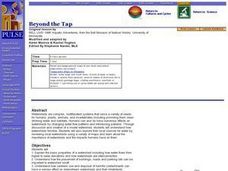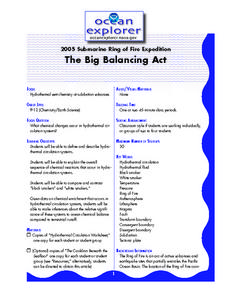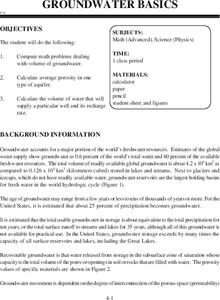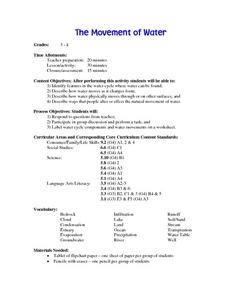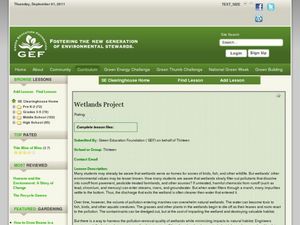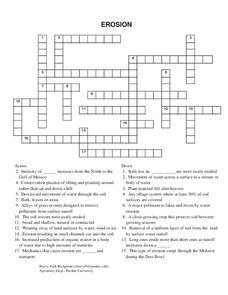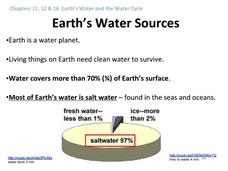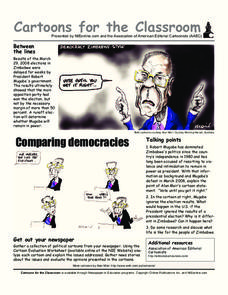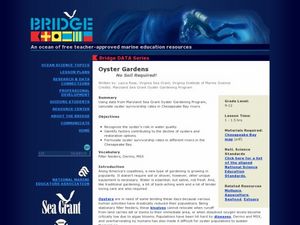Curated OER
Beyond the Tap
Students explain the basic properties of a watershed including how water flows from higher to lower elevations and how watersheds are interconnected. They comprehend how the placement of buildings, roads, and parking lots can be...
Curated OER
Class Conservation Corps (CCC)
Students investigate how the loss of soil, a valuable natural resource, affects their lives through loss of productive land to grow food, loss of coastal land mass, and poor water quality from runoff. They design a project to keep soil...
Curated OER
The Big Balancing Act
High schoolers describe chemical changes occurring in hydrothermal circulation systems. They make inferences about the significance of these systems to ocean chemical balance compared to terrestrial runoff.
PBS
The March on Washington and Its Impact
High schoolers read Martin Luther King, Jr's speech that he gave in Washington. They identify the social conditions that led to the civil rights movement. They discuss the significance of the March on Washington.
Curated OER
Groundwater Basics
Groundwater is an essential natural resource, not to mention a fascinating topic to study. Here is a series of twelve amazing lessons on the water source and how we use it in our daily lives. Concepts require higher math and physics...
Curated OER
The Movement of Water
Here is an excellent lesson plan on the water cycle and the states in which water exists. Learners identify the features of the water cycle, describe how water changes form, and look at ways that people affect the natural movement of...
Curated OER
Wonderful Wetlands
Fifth graders describe a wetland habitat and its components. They provide, in writing, at least one example of a wetland food chain, relate wetlands to ecological functions, and relate the importance of wetland functions to their own...
Curated OER
Understanding Scientific and Social Implications: Acid Rain
Learners examine the social and scientific implications of acid rain. In this acid rain lesson plan, students read an article about acid rain, the causes of acid rain, the effects of acid rain on the environment and the proposals to...
Curated OER
Wetlands in a Pan
Fifth graders explore the wetlands to discover its benefits in removing pollutants in the water. In this wetlands lesson, 5th graders discuss how stormwater wetlands are created to purify water. Students test the water.
Curated OER
The Chesapeake Bay in Captain John Smith's Time
When Captain John Smith visited the Chesapeake Bay in the summer of 1608, what types of animals and habitats did he encounter? Your young historians will analyze primary source documents to answer this question, as well as compare the...
What happened to the frogs?
Students will select ten rubber frogs and determine their pollutant source based on their malformations. Students will write a brief essay on their findings. Students will be engaged in the lesson the entire time!
University of Wisconsin
Rain Garden Species Selection
The activity really comes to life within its intended unit on starting a rain garden. Working in groups, participants research native plants and coordinate them with the conditions in the designated garden area. Give the class access to...
Curated OER
Erosion
In this erosion worksheet, students complete a crossword puzzle given 17 clues about the types of erosion, the causes of erosion and the results of erosion.
Marine Institute
Water Pollution
Sixth graders investigate the various types of pollutants found in water and ways to help prevent water pollution. Through a hands-on experiment, students create samples of polluted water by mixing water with vegetable oil, dirt, and...
University of Wisconsin
Designing a Rain Garden
Now it's time for all of the data collected in previous lessons to be applied to the design of a rain garden. This resource can only be used as part of the greater whole, since learners will need to rely on gathered knowledge in order to...
University of Wisconsin
Sizing a Rain Garden
Most appropriate if you are applying the entire unit to build a rain garden at your school, this installment involves calculating the area that will drain into it. Your garden planners will need data from previous lessons, so this one...
National Park Service
Erosion
A set of PowerPoint slides supports a lecture or class review of weathering and erosion. Viewers learn the definition of each and examine various photos for evidence. Erosion is further depicted as caused by wind, water, and ice....
Foundation for Water & Energy Education
How Can Work Be Done with Water Power? Activity C
Third in a set of lessons regarding reservoirs, dams, and hydropower, this involves a two-day hydropower plant simulation. Collaborative groups build, maintain, and finance the plant. The transparency of the reservoir setup can be...
Curated OER
Earth's Water Sources
General facts about Earth's water sources, human use, and the water cycle are outlined by this presentation. Slide three has a grammatical error and slide nine refers to the local watershed of the author, so you will need to make a few...
NOAA
It All Runs Downhill
Examine how pollution makes its way into an ocean with help from a model watershed. Scholars use household items to recreate a mini-watershed, equipped with pollutants, that when mixed with rain drain into a model's body of water. After...
Forest Foundation
Forest Watersheds
Where does the water we use come from? To understand the concept of a watershed, class members study the water cycle and then engage in an activity that simulates a watershed.
Curated OER
Cartoons for the Classroom: Comparing Democracies
Could a president just ignore election results? In this analysis handout, scholars consider this question as they read background information on the 2008 elections in Zimbabwe. Two political cartoons poke fun at President Robert Mugabe,...
Curated OER
Oyster Gardens - No Soil Required!
Explore the practice of oyster gardening. Because oysters play a vital role in marine ecosystems and their populations have declined, biologists are transplanting oyster seed to repopulate reefs. After learning about this practice,...
K12 Reader
Water Water Everywhere
The protection of our water supply is the subject of an article used in this cross-curricular reading comprehension worksheet. After studying the passage, readers use information from the text to respond to a series of comprehension...
Other popular searches
- Storm Water Runoff
- Contaminated Runoff
- Water Runoff
- Surface Runoff
- The Water Cycle Runoff
- Urban Runoff
- Rain Runoff
- Stormwater Runoff
- Water Cycle Runoff
- Algal Bloom Runoff
- Catfish and Runoff
- Polluted Runoff


